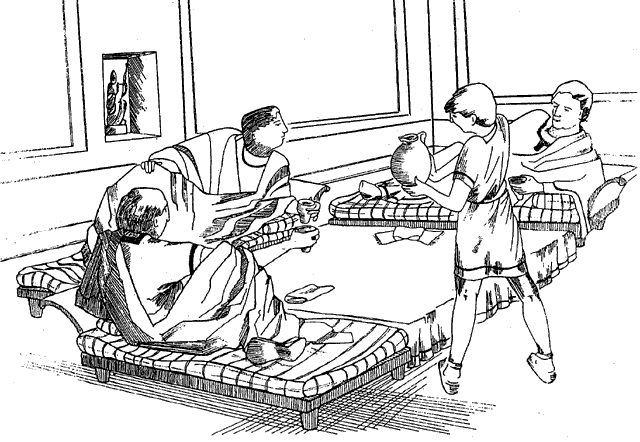John 12.1-7

1 The setting
The setting was six days before the Passover. It was a Saturday and Jesus was visiting Lazarus at his home in a village just outside Jerusalem called Bethany. It was a busy meal time. The disciples were there including John who was an eye witness. The men were sat down reclined around the table waiting for their meal. Martha was busy preparing the meal with Jesus as the guest of honour. Martha came in and served the meal.
Into this scene Mary, Martha’s sister, entered the room carrying a jar. The jar was a large jar of extremely expensive perfume known as nard. To everyones’ surprise she then poured the whole content over Jesus’ feet and then even more shockingly wiped his feet with her hair.
2 Nard a symbol of a bride’s love
Nard is also known as Spikenard and it is made from the root of the spikenard plant that grows in the Himalayan Mountains. It is made into an ointment and in those times it represented the gold standard for quality much like a Tiffany diamond might now.
This was outrageous extravagance. Nard had a very distinctive scent that would cling to the body for a long time. John 12:3 says, ‘the house was filled with the fragrance of the perfume.’ It is a lovely personal memory of John’s as he recalls the event.
Amongst other things nard is the perfume of deep love. The Hebrew for nard is also the word translated as perfume in the love poetry of the Song of Songs. There is a strong synergy in this passage with Song of Songs 1:12 where a bride speaks of her husband and king seated at his table. ‘While the king was at his table my perfume spread its fragrance.’ Nard was the most exotic fragrance and identified an exclusive and special love.
Where did a relatively humble woman like Mary get such a valuable perfume? The truth is we do not know. It has been speculated that it was her dowry or an inheritance.
3 Nard a symbol of Jesus’ sacrifice
This seemingly over the top gift has come to symbolize several things. First and foremost, Jesus understood what nobody else in the room had imagined, even Mary. ‘It was intended that she should save this perfume for the day of my burial.’ (John 12:7.) Jesus was fully aware of his imminent death and took this as part of his funeral arrangements.
4 Nard a symbol of untethered humble love
I want us to somehow grasp the complex emotional context of the event. Mary’s gift was her demonstration that she was prepared to give everything in her worship of Jesus. Nothing would stand in the way of her love for him including convention and appearances.
Convention expected that the anointing of oil or perfume would be on the head. Mary turned that on its head and in great humility gave her most precious possession to anoint Jesus’ feet. Such humility, such devotion. Mary is a great biblical example for worship. One can worship inspired by awe. Mary worshipped, inspired by love but she sought no special place. She was content to wipe his feet with her hair.
It would have been against Jewish convention for a woman to appear in the presence of men with her hair untied, but in Mary’s case love was stronger than convention. Does our sense of convention hold us back from fully expressing our love and worship of Jesus?
Just a few days later Jesus turned Mary’s foot washing back on his disciples, who had witnessed Mary’s act, by washing their feet prior to the last supper. Jesus ignored convention and set the supreme example of humility, service, obedience and above all of love for God the Father and love for the world.
This is unashamed love.
It is easy to look at Jesus’ enacting of washing the feet of his disciples as one of the great human demonstrations of humility through physical representation without fully taking into account who Jesus is. He is the Word of God in John 1:1, ‘In the beginning was the Word and the Word was with God, and the Word was God. He was with God in the beginning. Through him all things were made; without him nothing was made that has been made. In him was life, and that life was the light of all mankind.’ Here he is washing his disciples’ feet.
5 Generous love faces resentment
In Luke we get another picture of Mary’s devotion when Martha complains to Jesus that Mary is at Jesus feet listening to his teaching. Luke 10.38-42 This is not an account whose purpose is to show that a life of contemplation trumps practical action. That would be a false juxtaposition. It is just that it is not wise to fill one’s life with action to such an extent that one has no time to learn from him. Mary shows her love in that she wants to absorb the words of Jesus. This is a vital lesson for all disciples whatever our responsibility. Love says we should make time to listen and learn. That is part of worship and in itself requires discipline. Luke’s account is often portrayed as a false dichotomy.
6 Worship and emotions go together
The account of Mary and the jar of nard emphasizes the importance of our emotions in discipleship. Discipleship and faith are not simply matters of the intellect they are about personal commitment and love.
What encourages our love of Jesus?
How do we gain the right balance between worship and service?
Does anything stand in the way of our worshipping God?
Your Presence – Planetshakers
